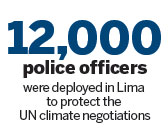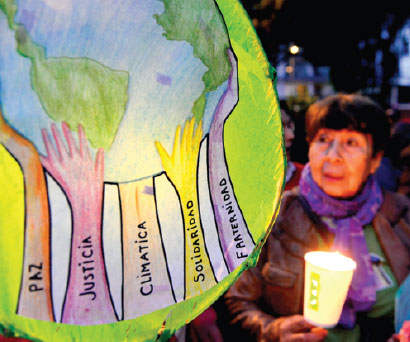Clock ticking for pledges to cut carbon emissions
Conference in Lima aims to prepare road ahead for global warming deal
Negotiators from more than 190 countries gathered in Lima on Monday for the last main stop of the UN climate negotiations on the road to a planned global warming deal in Paris next year.
The slow-moving talks have gained momentum in the past two months with pledges from the world's top carbon polluters - the United States, the European Union and China - to limit their emissions in the next 10 to 15 years.
"This sends an important signal for the rest of the world to come forward as early as possible with their own contributions," EU negotiator Elina Bardram said on Sunday in Lima. "We have 12 months and the clock is ticking."
India, Japan, Russia and Australia are among the major emitters that have not yet presented pledges for the new deal.
By getting pledges on the table well ahead of next year's climate conference in Paris, governments hope to pave the way for the landmark climate agreement they failed to reach five years ago in Copenhagen.

The goal is to slash the greenhouse gas emissions from the burning of fossil fuel that scientists say are warming the planet. The challenge is to find a way to share the burden between rich Western countries and emerging economies such as China and India, while helping the poorest and most vulnerable nations protect themselves against rising seas, droughts and other impacts of global warming.
Kyoto Protocol
The previous emissions treaty, the 1997 Kyoto Protocol, covered only industrialized countries.
Peruvian President Ollanta Humala said, "It is urgent that we create the greatest alliance in history against climate change."
A key issue in Lima will be to define what information countries should provide when they present their formal pledges early next year, so that they can be compared against each other.
The overall goal of the talks is to keep global warming below 2 C compared to preindustrial times. But some scientists say that goal is becoming unrealistic. Global average temperatures have already gone up about 0.8 C, and carbon emissions continue to rise every year.
On the eve of the conference, environmental groups were urging governments to raise their ambitions. Some protesters projected a message promoting renewable energy on a hill that rises out of Peru's Machu Picchu ruins. Other activists said they launched a fast to show solidarity with victims of climate change.
The Peruvian government said more than 12,000 police were deployed to protect the conference. The event is taking place in a tent city on the grounds of the military headquarters.
|
People attend a candlelight vigil organized by the Interfaith Council of Peru at a park in Lima, on Sunday, just hours before the opening of a climate change conference. Cris Bouroncle / Agence France-Presse |
(China Daily 12/02/2014 page12)















